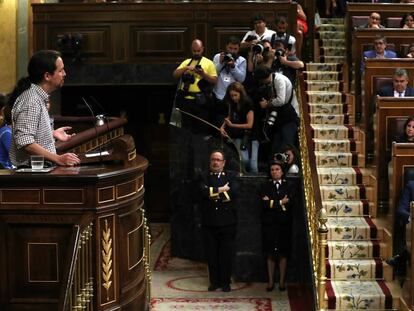In wake of failed investiture bid, Socialists rule out coalition government
Acting deputy PM Carmen Calvo said the party would not negotiate Cabinet positions with Unidas Podemos after the anti-austerity group abstained from last week¡¯s crucial vote

In the wake of Pedro S¨¢nchez¡¯s failure to get confirmed by parliament as the new prime minister of Spain, his Socialist Party (PSOE) is keeping all avenues open, including the possibility of a repeat election in November. In accordance to Spanish legislation, there is now a two-month countdown for a candidate to step up with a new bid before parliament is dissolved and fresh elections called.
S¨¢nchez never wanted a coalition government with Podemos
Sources at the PSOE said that in the coming weeks S¨¢nchez will try to assemble the majority he needs to mount a new investiture bid: 176 affirmative votes, or more yes than no votes in a second round.
But after the leftist Unidas Podemos last week rejected S¨¢nchez¡¯s last offer of three ministerial positions and a deputy PM spot ¨C the anti-austerity group said these posts lacked any effective power ¨C there will be no further offers for Cabinet positions, said government sources.
On Friday, acting Deputy Prime Minister Carmen Calvo said the Socialist would not negotiate a coalition government with Unidas Podemos. ¡°This path is no longer open,¡° she explained. ¡°It is time to explore other scenarios to avoid elections.¡±
Senior Socialist officials said that there are also differences of opinion between the PSOE and Unidas Podemos over the budget allocations for social spending, as well as over economic issues and the Catalan crisis.

Above all, S¨¢nchez never wanted a coalition government with Podemos, which has 42 seats in Congress, but rather a single-party administration with a few independents, said sources familiar with the early talks between both groups.
If Spaniards are asked to go to the polls again, nobody knows who will benefit the most. Socialist sources said that voters might be weary of the stalemate and show more support for the two traditional parties, the Popular Party (PP) and the PSOE, to the detriment of the newer groups (Podemos and the center-right Ciudadanos).
The Socialists won the April 28 election with 123 seats, far short of an overall majority, and the country has been under a caretaker administration since then. Before that, S¨¢nchez had been leading a minority government since June 2018, when he led a successful no-confidence motion against Mariano Rajoy of the PP.
¡°Europe is accustomed to this sort of situation¡±
While Spaniards wait to see whether they are asked to go to the polls for a record fifth time this year (there were national, regional, local and European elections earlier this year), Europe is also watching closely.
But ¡°Europe is accustomed to this sort of situation,¡± says Jos¨¦ Manuel Albares, 47, a career diplomat who works as secretary general for international affairs and acts as S¨¢nchez¡¯s top advisor on foreign issues.
Belgium is immersed in a process that will be longer than Spain¡¯s, and it took Merkel six months to form her government
Jos¨¦ Manuel Albares
¡°It is not unusual. Belgium is immersed in a process that will be longer than Spain¡¯s, and it took [Angela] Merkel six months to form her government after the elections... What Europe appreciates is Pedro S¨¢nchez¡¯s solid leadership, his commitment to Europe and his desire for a strong, efficient government,¡± he says.
Albares says that S¨¢nchez was a key figure at the recent negotiations for EU institutional positions, which ¡°required crafting agreements between three political families and 28 member states, while cordoning off the far right so it would not occupy any positions of power from which to undermine the EU¡¯s values.¡±
¡°If this was possible in Europe, why would it not be possible in Spain? It¡¯s true that [Spain] has joined the democratic game later than others, and maybe some parties have not properly assimilated a negotiating capacity, but it is hard to believe that Pedro S¨¢nchez should be able to do it abroad and not here.¡±
English version by Susana Urra.
Tu suscripci¨®n se est¨¢ usando en otro dispositivo
?Quieres a?adir otro usuario a tu suscripci¨®n?
Si contin¨²as leyendo en este dispositivo, no se podr¨¢ leer en el otro.
FlechaTu suscripci¨®n se est¨¢ usando en otro dispositivo y solo puedes acceder a EL PA?S desde un dispositivo a la vez.
Si quieres compartir tu cuenta, cambia tu suscripci¨®n a la modalidad Premium, as¨ª podr¨¢s a?adir otro usuario. Cada uno acceder¨¢ con su propia cuenta de email, lo que os permitir¨¢ personalizar vuestra experiencia en EL PA?S.
?Tienes una suscripci¨®n de empresa? Accede aqu¨ª para contratar m¨¢s cuentas.
En el caso de no saber qui¨¦n est¨¢ usando tu cuenta, te recomendamos cambiar tu contrase?a aqu¨ª.
Si decides continuar compartiendo tu cuenta, este mensaje se mostrar¨¢ en tu dispositivo y en el de la otra persona que est¨¢ usando tu cuenta de forma indefinida, afectando a tu experiencia de lectura. Puedes consultar aqu¨ª los t¨¦rminos y condiciones de la suscripci¨®n digital.










































